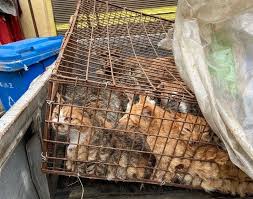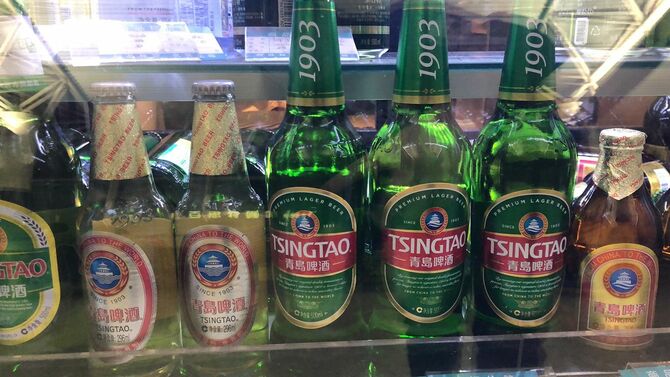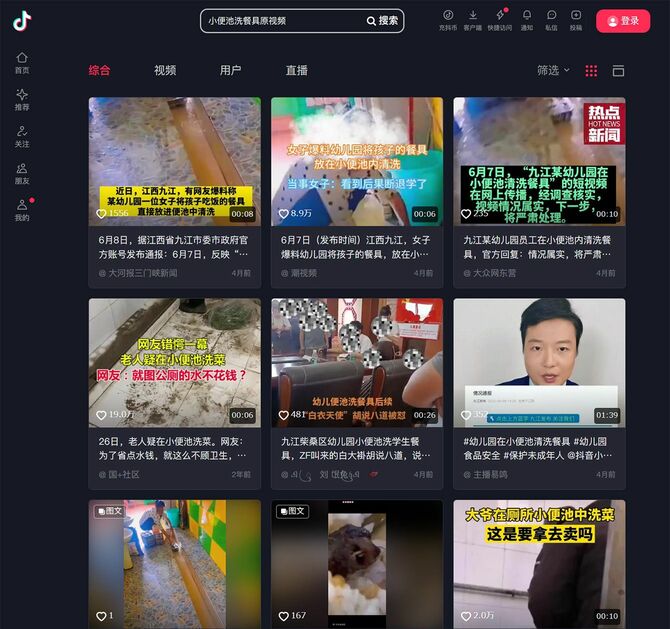Employee urinates on beer ingredients; video spreads around the world
The unbelievable sight of an employee urinating on a valuable product was caught on a surveillance camera in China. The contaminated product was beer, which was supposed to quench the thirst of the people after a hard day’s work.
The scandal was discovered at Qingdao Beer, China’s second largest beer manufacturer. An employee was filmed urinating into a beer tank, and the video spread on the Internet, leading to an investigation by the authorities. The video went viral on the Internet, resulting in an investigation by the authorities.
The content of the video is shocking. It shows a uniformed and helmeted worker climbing over a high wall, entering a tank, and urinating into a container of ingredients. The incident drew international attention and was reported by the BBC and other media. According to Hong Kong’s South China Morning Post, Qingdao Beer said, “The malt lot in question is now completely sealed off. The company will continue to strengthen its control procedures to ensure product quality,” and acknowledged the problem.
Rat Heads Gorged from School Cafeteria Meals
While Qingdao Beer has been harshly criticized, this is not the first time a scandal has occurred in China. Food safety issues have repeatedly sparked confusion in the country.
In June of this year, rat heads were found in school lunches at a vocational school. According to a report by CNN, a student at a vocational school in Jiangxi Province claimed on social media that he found a rat’s head in a dish in the student cafeteria. This quickly spread and has become a major problem.
The school initially falsely claimed that the object found was a “duck head. Later, the local government launched an investigation into the matter and concluded that it was in fact a rat’s head.
The diner was sanctioned with the revocation of its business license, and the operating company was subjected to maximum penalties under the Food Sanitation Law. In addition, the school and the officers of the Market Surveillance Authority have also been punished.
CNN notes, “The uproar has also exposed the public’s deep distrust of China’s local governments, whose attempts to cover up negative news have often backfired.
Another Rat Incident in Just Four Months
The rat racket continues. In October of this year, the heads of rats were found in school lunches at another school. The Global Times, a state-run English-language daily, reported the story.
According to the article, a student at North China University of Science and Technology said on social media that he found a rat head in a student cafeteria meal. The student posted a photo of the foreign substance in the meal and declared that it was a “rat head. The post went viral and sparked widespread food safety concerns both inside and outside the school.
Another user who spread the post said, “Look. You can see the mouth, hair, and beard,” and re-posted the photo on the school’s community bulletin board.
The university terminated its contract with the cafeteria vendor. Only a few food stands remained open at the university for some time after the incident. The repeated food scandals at the school highlight the difficulty of restoring trust and improving the situation.
Moldy Bread and Rotten Geso… “Like Zombie Meat
Food safety concerns have been raised in Chinese schools before; an outbreak at the prestigious Chengdu 7th Experimental High School in 2019 illustrates the depth of the problem.
According to a BBC report with photos, numerous foodstuffs, including moldy bread and rotten geso, were stored in poor sanitary conditions at the school.
Parents attending a tree-planting festival accidentally wandered into the cafeteria on March 11, 2019, and found a large amount of rotten food, including bread, meat, and seafood. Parents immediately posted about the incident on social media, and after criticism, the school arranged for two trucks to haul away the rotten food.
After the incident, the school apologized and announced that it was terminating its contract with the food supplier. Meanwhile, parents who discovered the problem pointed out that this was not an isolated incident, and that the same vendor supplies food to more than 100,000 students in more than 20 schools.
One parent who saw the rotting foodstuffs told the BBC, “The smell is disgusting. It looks like pig feces,” he said, revealing his disgust. Another parent mentioned that there was another incident last November in which many students suffered from various health problems, including stomachaches and constipation. This parent commented, “It looks like it was kept in the freezer for years. It’s like zombie meat,” he commented.
According to the Australian public broadcaster ABC, the incident caused an outpouring of anger among parents. Parents crowded the front of the school and clashed with riot police across the closed school gate fence. While the authorities commented that there was no problem with the school, the clash led to the arrest of several parents, causing further ripples.
A kindergarten employee washing dishes in a urinal
Sanitation scandals have also occurred in kindergartens. In June of this year, a kindergarten in China’s Jiangxi Province was found to have been washing children’s lunch trays in the urinals of their toilets. The incident drew significant criticism.
The South China Morning Post’s video shows a urinal with a trench dug into the ground in the toilet. A female employee is seen crouching in front of it and using a hose to wash a tray with compartments that are supposed to serve food directly on it.
The incident once again highlights a food safety issue that is a frequent occurrence in schools and universities throughout China. The mother who shot the video was extremely shocked and revealed that she had transferred her child to another kindergarten.
Internet users who saw the video posted more than 50,000 angry comments. The South China Morning Post highlighted the comments of the outraged viewers. Children are loved so much by their parents at home, but in kindergartens they are treated like livestock.”
The video has been widely disseminated via Dowin, the Chinese version of TikTok (a Chinese video platform also operated by ByteDance, as opposed to the international version of the brand TikTok) and other channels.
Cases of expired foodstuffs endorsed by the authorities
The list of incidents is endless. In September 2018, expired sausages and other foodstuffs were served to children at a kindergarten in Wuhu, Anhui Province. The state-run English-language daily China Daily reported.
According to the paper, this marks the third food problem in the city in just one month. In the previous incident, surveillance authorities allowed a kindergarten to cook and serve moldy raw rice and rotten chicken feet. The food thus prepared was actually served to the children.
China Daily lamented the issue, “The fact that children have been the victims of food safety scandals in the city three times in one month shows that the law is not working as a deterrent.
Capturing stray cats and selling them falsely as pork
Finally, a shocking news story was reported on October 24 this year. While there is a laughable joke that cheap fast food restaurants may be using cat meat, cats are actually being sold as meat in China; according to CNN, 1,000 cats were rescued just as they were about to be turned into sausages.
Chinese police have uncovered an illegal business that sells cat meat as pork and mutton. They rescued about 1,000 cats from a truck heading to a slaughterhouse.
Without police intervention, the captured cats were likely to have been slaughtered and used as pork, mutton skewers, or sausages for food; CNN notes that such illegal businesses are “causing new food safety concerns.”
Originally, a large number of cats were found trapped in crates with nails driven into them near a cemetery, and a group of activists began a stakeout. When they began transporting them to a slaughterhouse, the group intervened and called the police.
Upon receiving the activists’ report, police in Zhangjiagang, Jiangsu Province, China, stopped the truck carrying the cats and thwarted the plan. The rescued cats were protected and taken to a nearby shelter, and CNN reported, based on information from local media, that after processing, cat meat is usually disguised as pork or mutton and sold for about $4 per pound (450 g) (about 600 yen).
China’s “food hygiene” is still on par with developing countries…
The food safety problems sweeping across China, in their severity and pervasiveness, highlight the lack of awareness of food safety. Everywhere in this vast country, from internationally renowned manufacturers to schools and perhaps even small street stalls on street corners, food hygiene and safety issues lurk as problems that cannot be ignored.
In many cases, this problem is no longer unique to a few organizations, but is a major issue for the country as a whole.
Although Qingdao Beer is cooperating with the police regarding the scandals, it is inevitable that consumers at home and abroad will take a hard look at the company. A number of scandals have also occurred in schools and kindergartens, and it is hard to trust the work done in unseen places at all.
Needless to say, food hygiene is an issue directly related to people’s lives and directly affects consumers’ health. The incidents of trays being washed in kindergarten toilets and the attempted mislabeling of cat meat are examples that eloquently illustrate the lack of awareness of quality.
China is increasing its international presence through technological cooperation and economic aid to developing countries, but domestically, improving the most basic environment, namely food, has been a longstanding issue, and it seems that no solution has yet been found.
Aoba Yamato












